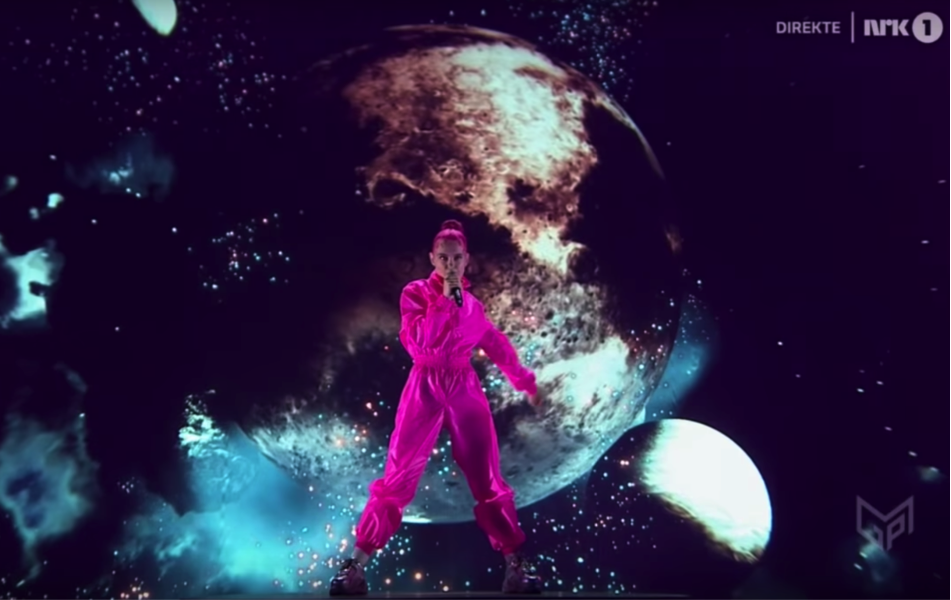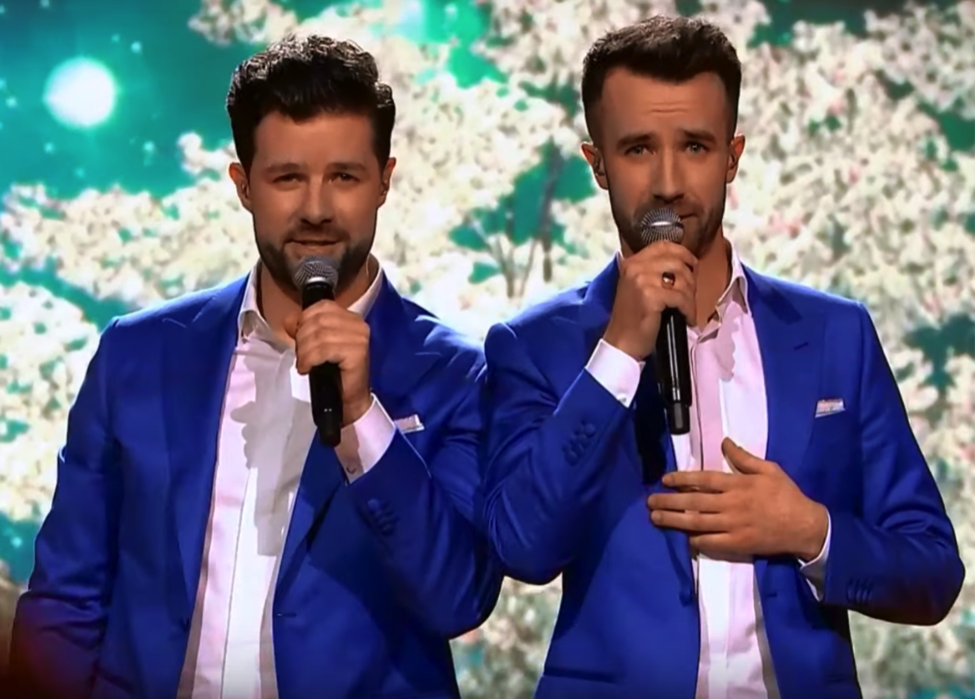On 15 February, Melodi Grand Prix comes to Trondheim Spektrum for the first time in the national final’s history for an eventful conclusion after 5 semi finals, each celebrating a region of Norway, hosted in H3 Arena outside Oslo.
The show opened with KEiiNO’s Eurovision 2019 televotes winner, “Spirit in the Sky,” and the ten finalists were introduced as a part of the performance’s instrumental break.
The Format (Or, How It Was Supposed to Work)
The finalists consist of five pre-selected entries chosen by a jury led by Stig Karlsen and five entries advanced through each of the semi finals. In the first round, the ten finalist songs will each perform once. Unlike past years, where the four entries that advance to the Gold Final are selected through 50% international jury voting and 50% televotes, this year’s selection will be done through 100% online voting. During the performances, the audience can also react to the songs by selecting one of three emojis, which will be displayed at the end of each performance.
In the Gold Final, another round of online voting will determine the 2 songs advancing to the Gold Duel. Unlike past years (and unlike the semi finals this year), where the four songs in the Gold Final were divided into two pairs, the 2 songs with the highest online votes out of all 4 entries will advance. Each Gold Duel qualifier will then perform again before a final round of online voting will determine the winner.
The Songs
I have to preface this by saying that with the extended format of the show this year, I didn’t have the time or energy to follow all five semi finals closely, although I did try my best to listen to the studio versions of most of the songs this year and follow the results. As such, I wouldn’t be offering any comments on how each performance changed from the semi final to the final.
Raylee - Wild (Semi 1 Winner)The show goes off to an energetic start with this up tempo, high energy banger. It’s a solid performance from Raylee, though my one complaint would be that it maintains the same energy level throughout the song to its detriment, as it lacks the sense that it was building to a true climax. The ad libs and high notes towards the end of the song seem intended for a “climax,” but the insufficient power of Raylee’s vocals prevented them from coming off as such.
Didrik & Emil - Out of Air (Pre-qualified)The song itself is more or less the standard issue euro-ballad, but Didrik and Emil did their best to make it work with their mostly solid vocals (although they seemed to struggle a bit with the lower, softer notes in the verses) and charisma.
Magnus Bokn - Over the Sea (Semi 4 Winner)This song was co-written with JOWST and Alexander Rybak, both of past Eurovision fame, and the latter’s involvement really showed with the violin intro. The violin gimmick aside though, it’s another average song elevated by a solid performance and the early 20th century dock worker aesthetic of the staging.
Akuvi - Som du er (Pre-qualified)I always appreciate native language songs in Eurovision and the national finals. That said though, this isn’t really the type of music that I normally like at all. It’s a catchy song from a charismatic performer, and her vocals were fine but not powerful enough in key moments to achieve maximum impact.
Kristin Husøy - Pray for Me (Semi 3 Winner)The monochrome opening immediately caught my interest. While the goal seemed to be soulful vocals, there’s a bit of nasality to her voice (not sure if it’s her techniques or just the accent when it comes to diction) that prevents it from hitting the mark completely. Still, it acquits itself well as a classy entry with a bit of an attitude and nice potentials.
Rein Alexander - One Last Time (Semi 2 Winner)This has got to be one of my biggest guilty pleasures this Eurovision season. Its concept is very much Denmark 2018 meets Game of Thrones, and while it can be cheesy, it speaks to my inner music theater geek so well that I can’t help but to be fond of it. The vocals here are also impeccable. It’s one of those songs that would likely be annihilated by the juries were it to appear in Eurovision, but are just so much fun that you always, secretly or not so secretly, hope that there’s at least one of these in the show to keep things interesting.
Tone Damli - Hurts Sometimes (Pre-qualified)First thought: too many pearls. I like the opening shots and how the backdrop opens to the audience behind her to break the illusion of the MV-like look in the first section, but the song itself is rather forgettable.
Sondrey - Take My Time (Pre-qualified)Hello, Sweden 2017 - 2018, and all the sleek over-production from those songs and staging that I don’t miss. Sondrey is a capable performer with a great voice and charisma, but there’s so little of his character on that stage that I can’t help but to wish him better luck with a song that’s more him in a future year.
Ulrikke Brandstorp - Attention (Pre-qualified)Another song co-written by a past Eurovision contestant (Kjetil Mørland), this seems like the clear fan favorite judging by the cheers in the arena. The staging is rather simple, and the dress Ulrikke wears is frankly a ghastly glitter nightmare, but her voice is more than enough to completely own the stage.
Liza Vassilieva - I Am Gay (Semi 5)Maybe I’m too much of a cynical miser, but the lyrics of this song reeks of a calculated attempt to play to a certain audience, and the fact that according to reports, Liza herself isn’t even a part of the LGBT+ community certainly doesn’t help matters. It’s a catchy song and a fun performance to close the show though.
The Results (Or How It Actually Went Down)
During the last two songs, signs of trouble began with the post-performance emojis disappearing. It turned out that 38 million emojis sent in by the viewers overwhelmed the server, and the voting system remained down for pretty much the duration of the time scheduled for the first round of voting. After the voting system appeared to come online, the finalists were invited back onto the stage where the presenters proceeded to announce the four winners going on to the Gold Final to the audience’s bafflement and audible booing in the arena. As it turned out, NRK decided to go with a backup jury vote (which was later revealed in a press release to be 30 preselected audience members that were supposed to be representative of the voting demographic) instead of risking overrunning the schedule by waiting to fix the problem and then reopening voting.
Based on the replacement jury vote, the four winners are, in the order of announcement: Kristin Husøy, Ulrikke Brandstorp, Liza Vassilieva, and Raylee
After another round of voting buffered by interval acts including past MGP songs being sung by local Trondheimers, the two finalists going on to the Gold Duel are revealed to be Kristin Husøy with “Pray for Me” and Ulrikke Brandstorp with “Attention,” who each perform their songs again. Kristin Husøy’s voice cracks in a key moment before she recovers herself quite nicely for a otherwise solid performance. Ulrikke, however, seemed to be on another level, with her performance coming off as a winner’s victory lap more than merely one half of a final duel.
After the performances, Norway votes again. For the final results announcement, past MGP and Eurovision stars are brought on to call out the votes for their home regions: KEiiNO’s Tom Hugo (Eurovision 2019) of Kristiansand for Southern Norway, Trondheim native Margaret Berger (Eurovision 2013) for Central Norway, Agente (Eurovision 2016) from Finnmark for Northern Norway, Bjørn Johan Muri (MGP Gold Finalist 2010) of Ålesund for Western Norway, and Åge Sten Nilsen (Eurovision 2007 as a part of Wig Wam and MGP 1998 and 2017) of Sarpsborg for Eastern Norway.
And the results are, in order of announcement (Kristin Husøy : Ulrikke Brandstorp):
Southern Norway - 16756 : 19854
Central Norway - 51176 : 21770
Northern Norway - 19932 : 17152
Western Norway - 37107 : 38906
Eastern Norway - 69696 : 102663
Total - Kristin Husøy 194,667 vs Ulrikke Brandstorp 200.345
With a difference of less than 6,000 votes, Ulrikke takes it home and wins the ticket to Rotterdam in May!



















